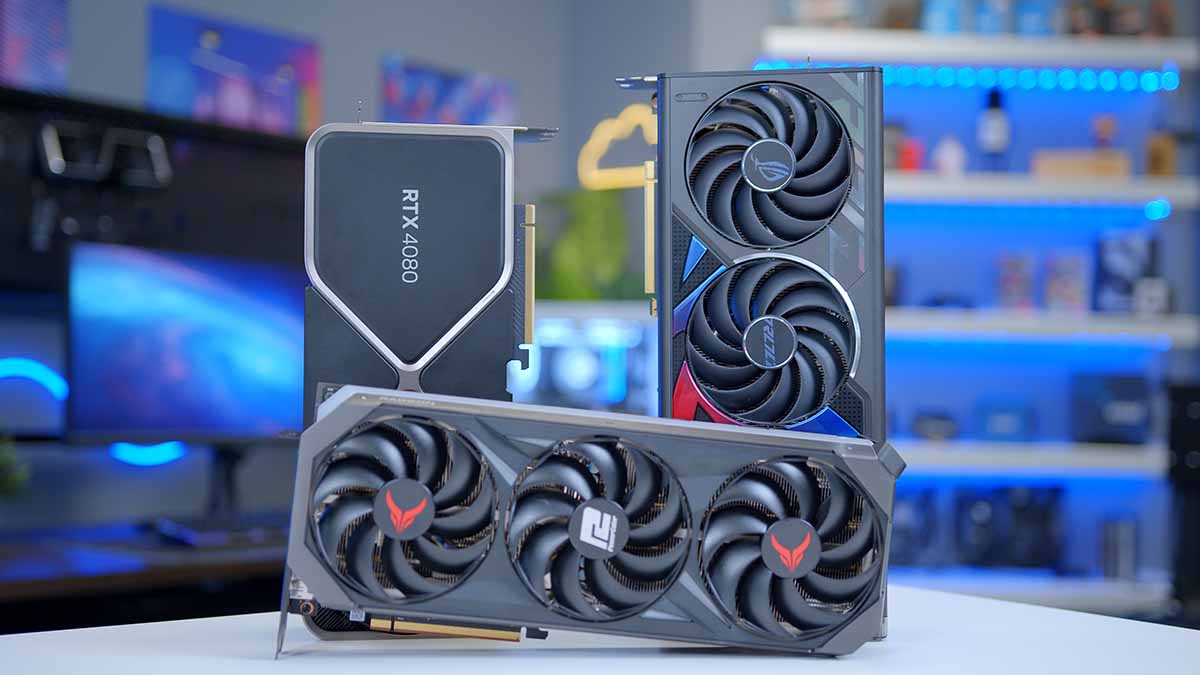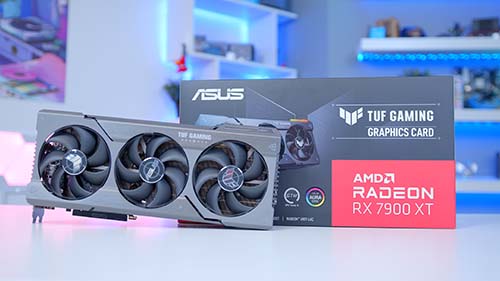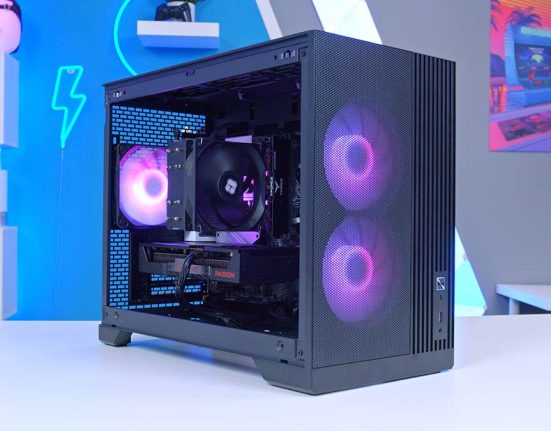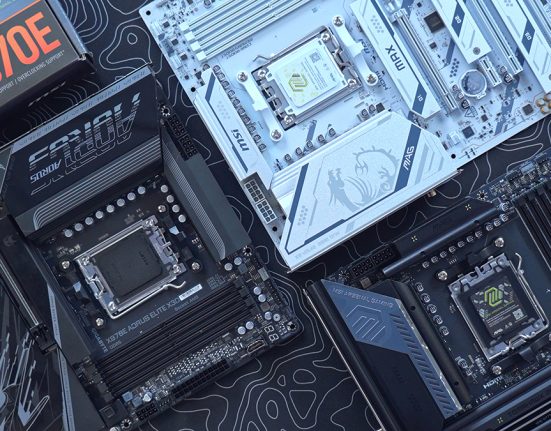Introduction
The Intel Core i7-14700K is a high-performance CPU geared towards those who need plenty of cores and threads to handle demanding applications. These attributes also make the Core i7-14700K an excellent processor for gaming, providing great metrics at 1440p and 4K when paired up with the right GPU. But what are the best graphics cards to buy for the Intel Core i7-14700K?
We’ve tested many graphics cards alongside the Core i7-14700K to see which options provide the best performance at various price points. With cards from AMD and NVIDIA, this guide caters to many different buyers with varying use cases and budgets. Each of the cards below features an in-depth analysis where the hardware, features and performance have been assessed to see what kind of value is on offer.
The Best Graphics Cards for the 14700K
1. AMD Radeon RX 7900 XT

The AMD Radeon RX 7900 XT is the first of our picks in this roundup for several reasons, the principal being its value proposition. While the RX 7900 XT hasn’t had the easiest ride due to poor pricing at launch, subsequent price reductions have made this GPU formidable.
The RX 7900 XT has a healthy VRAM allocation of 20GB and a memory bus width of 320 bits. This GPU has a solid boost clock speed of 2.4GHz, 5376 stream processors, and 84 ray accelerators. This leads to strong performance, where the RX 7900 XT can easily handle AAA titles at 4K high settings across the board.
The RX 7900 XT’s power draw is 315W, which is quite high. However, a 750W unit should be more than ample to provide enough juice for your 14700K PC build.
| Key Specs | AMD Radeon RX 7900 XT |
|---|---|
| Video Memory Capacity | 20GB GDDR6 |
| Memory Bus | 320-Bit |
| Base Clock Speed | 1.5GHz |
| Boost Clock Speed | 2.4GHz |
| Stream Processors | 5376 |
| Ray Accelerators | 84 |
| Power Draw | 315W |
| MSRP | $699 |
Unfortunately, the one major caveat of the RX 7900 XT is its weaker ray tracing performance. AMD graphics cards are still behind NVIDIA when it comes to ray tracing, which leads to a big dent in framerates when ray tracing is enabled. This won’t be a deal-breaker for everyone, but NVIDIA will be a preferential pick for those with an eye on top-tier shadows and reflections.


Suggested Article: Best Motherboards to Buy for the Core i7-14700K
2. NVIDIA GeForce RTX 4080 SUPER

The RTX 4080 SUPER hit the market as part of a mid-life refresh to existing RTX 4000 series graphics cards. This refresh delivered modest hardware improvements, such as increased core counts and clock speeds for additional framerates.
The original RTX 4080 was already a powerful GPU but came in at a price point that was difficult to swallow for some. The SUPER refresh changed this with an MSRP drop to $999 and a performance bump between 5% and 10%, depending on the title.
Regarding the hardware upgrades, the RTX 4080 SUPER has moderate clock speed improvement up to 2.55 GHz, as opposed to 2.50. Core counts have also been increased, with the RTX 4080 SUPER now sitting at 10240 CUDA cores and 80 RT cores, as opposed to the 9728 and 76 cores, respectively, on the standard RTX 4080.
For this reason, performance hasn’t improved drastically versus the non-SUPER RTX 4080, but this doesn’t mean the RTX 4080 SUPER is a poor-performing card by any means. The RTX 4080 SUPER can hit strong framerates at 4K maxed-out settings across AAA titles and Esports games, especially with ray tracing enabled. The RTX 4080 SUPER also provides great metrics within other demanding non-gaming workloads.
| Key Specs | NVIDIA GeForce RTX 4080 SUPER |
|---|---|
| Video Memory Capacity | 16GB GDDR6X |
| Memory Bus | 256-Bit |
| Base Clock Speed | 2.29GHz |
| Boost Clock Speed | 2.55GHz |
| CUDA Cores | 10240 |
| RT Cores | 80 |
| Power Draw | 320W |
| MSRP | $999 |
While we commend NVIDIA’s adjustment to the price of the RTX 4080 SUPER, AMD’s RX 7900 XTX is a strong graphics card that remains worth considering at this price point. AMD has not been afraid to drop prices to undercut NVIDIA, which has frequently changed our recommendations over the last year.


3. NVIDIA GeForce RTX 4070 Ti SUPER

NVIDIA’s RTX 4070 Ti SUPER is yet another card in our roundup to receive the ‘SUPER’ treatment. Receiving significant hardware improvements compared to the RTX 4070 SUPER and RTX 4080 SUPER, this card gains around 15% more raw performance and extra video memory. These upgrades better align the RTX 4070 Ti SUPER with its $799 MSRP, making it a formidable choice in this price bracket.
The most significant changes to the RTX 4070 Ti SUPER are the increased VRAM, which moves up to 16GB instead of 12GB, and the 256-bit memory bus, versus a 192-bit design on the original RTX 4070 Ti. CUDA cores also rise to 8448 from 7680. The power draw hasn’t increased either, so there are no changes to PSU recommendations over the original RTX 4070 Ti design.
These changes to the hardware bring around 10-15% more performance across AAA games and Esports titles at 1440p and 4K. Great ray tracing metrics are also one of the major benefits of NVIDIA GPUs. Framerates can also be improved by utilising DLSS 3.0 and Frame Generation in supported games.
| Key Specs | NVIDIA GeForce RTX 4070 Ti SUPER |
|---|---|
| Video Memory Capacity | 16GB GDDR6X |
| Memory Bus | 256-Bit |
| Base Clock Speed | 2.34GHz |
| Boost Clock Speed | 2.61GHz |
| CUDA Cores | 8448 |
| RT Cores | 66 |
| Power Draw | 285W |
| MSRP | $799 |
The biggest weakness of the RTX 4070 Ti SUPER remains its price point. While the RTX 4070 Ti SUPER is not bad value, aggressive price drops from AMD on their competing RX 7900 XT make the purchase decision much more tricky.


4. AMD Radeon RX 7800 XT

AMD’s Radeon RX 7800 XT is a value titan, offering solid 1440p gaming performance. The RX 7800 XT comes at a highly competitive price point, with an MSRP of $499.
Through our testing, detailed below, we’ve found that the RX 7800 XT can compete with the RTX 4070 SUPER surprisingly well. In many titles, we even see the RX 7800 XT coming out on top despite its $100 lower MSRP. Rasterised gameplay at 1440p is a massive strength of the RX 7800 XT, which is why this GPU is such a great offering within the lower end of the mid-range market.
The RX 7800 XT has 16GB of GDDR6 VRAM and a 256-bit memory bus. 16GB is undoubtedly the sweet spot for most AAA games at 1440p. Alongside the healthy VRAM capacity, the RX 7800 XT has a solid boost clock speed of 2.43GHz, 3840 stream processors, and 60-ray accelerators.
| Key Specs | AMD Radeon RX 7800 XT |
|---|---|
| Video Memory Capacity | 16GB GDDR6 |
| Memory Bus | 256-Bit |
| Base Clock Speed | 1.29GHz |
| Boost Clock Speed | 2.43GHz |
| Stream Processors | 3840 |
| Ray Accelerators | 60 |
| Power Draw | 263W |
| MSRP | $499 |
Weak 4K gaming performance is the biggest caveat to consider. The RX 7800 XT is a powerful 1440p card but struggles at 4K compared to the other GPUs in our testing. For those planning to play most of their games at 4K, we’d recommend looking at a more capable graphics card.


How We Tested the Best Graphics Cards for the 14700K
To provide informed product recommendations, we require a massive amount of data. This is why our graphics cards are tested rigorously and methodically to ensure we have a big data set to compare and consolidate which graphics cards are worth recommending. All our GPUs are tested at three different resolutions at varying settings within AAA and Esports titles to ensure we have a full suite of current and relevant benchmarks. To ensure that all of our testing is fair and repeatable, we’ve published a full rundown of our settings in a How We Test Graphics Cards article.
Hogwarts Legacy @ 1440p
Settings: 1440p, Shadow Quality High, Indirect Lighting High, Reflections High, Crowd Density High, Particle Quality High, Volumetric Lighting High, Motion Blur off, GTAO Quality High, Grass Quality High, Contact Shadows High VSync Off, DLSS/FSR: On/Off, Ray Tracing: On/Off, Textures: High
In Hogwarts Legacy at 1440p high settings, performance across the board was tightly knit. The RTX 4080 SUPER came out on top with an average framerate of 131FPS, while the RX 7800 XT offered a slightly lower 102FPS. However, the RX 7900 XT and RTX 4070 Ti SUPER were two frames apart, offering 115FPS and 117FPS, respectively.

Hogwarts Legacy @ 4K
Settings: 4K, Shadow Quality High, Indirect Lighting High, Reflections High, Crowd Density High, Particle Quality High, Volumetric Lighting High, Motion Blur off, GTAO Quality High, Grass Quality High, Contact Shadows High VSync Off, DLSS/FSR: On/Off, Ray Tracing: On/Off, Textures: High
When the in-game resolution was dialled up to 4K, performance was slightly diminished, with all the GPUs in this roundup sitting below the 100FPS mark. Hogwarts Legacy is an intense game, so this explains why the framerates are lower, but all of the graphics cards we’ve tested offered framerates above 60FPS, which is still smooth and more than playable.
The RX 7800 XT and RTX 4070 Ti SUPER were closely aligned, with 65FPS and 67FPS averages in this benchmarking run. Similarly, the RX 7900 XT and RTX 4080 SUPER sat closer together, with an 88FPS and 91FPS average.

Apex Legends @ 1440p
Settings: 1440p, Anti-aliasing TSAA, Texture Filtering 8X, Model Detail High, VSync Disabled, Effects High, Ambient Occlusion Quality High
Switching over to Apex Legends at 1440p high settings, framerate averages are much more favourable in this benchmark. All of the cards in this roundup could withstand 1440p with ease, offering more than 200FPS across the board.
The RX 7800 XT provided 232FPS, while the RTX 4070 Ti SUPER, RX 7900 XT, and RTX 4070 SUPER had fewer frames. The RTX 4080 SUPER sits at the top with 271FPS, while the RTX 4070 Ti SUPER outputs 256FPS, followed by the 263FPS from the RX 7900 XT.

Apex Legends @ 4K
Settings: 4K, Anti-aliasing TSAA, Texture Filtering 8X, Model Detail High, VSync Disabled, Effects High, Ambient Occlusion Quality High
Changing the resolution to 4K diminishes performance, but all the GPUs in this roundup held up very well. The RX 7800 XT provided 155FPS within this benchmark, sitting well above the 144Hz sweet spot. The RTX 4070 Ti SUPER and RX 7900 XT were 11 frames apart, with 177FPS and 188FPS averages, respectively. The RTX 4080 SUPER was the most impressive, providing 201FPS during this run.

Frequently Asked Questions
Is DLSS Better than FSR?
At the moment, yes. DLSS is noticeably better than FSR, but AMD’s pillar technology is slowly catching up with improvements to FSR and Fluid Motion Frames, constantly arriving with new drivers.
How Much VRAM Do I Need?
For 1440p gaming, 12GB-16GB is the sweet spot, with 16GB providing the most longevity in modern games. We recommend 16GB or higher for 4K gaming.
Who is Better at Ray Tracing – AMD or NVIDIA?
NVIDIA is. While AMD is slowly catching up to NVIDIA, with improvements to ray tracing being made constantly, NVIDIA’s technology is superior in terms of achievable performance.








![FI_[DM89] Phanteks Evolv + AORUS 5090 9850X3D Gallery (8)](https://geekawhat.com/wp-content/uploads/2026/02/FI_DM89-Phanteks-Evolv-AORUS-5090-9850X3D-Gallery-8-551x431.jpg)

![FI_[DM87] HAVN BF & RTX 5090 Build](https://geekawhat.com/wp-content/uploads/2026/01/FI_DM87-HAVN-BF-RTX-5090-Build-551x431.jpg)

![FI_[DM86] Montech King 45 Pro + RX 9070](https://geekawhat.com/wp-content/uploads/2026/01/FI_DM86-Montech-King-45-Pro-RX-9070-551x431.jpg)
